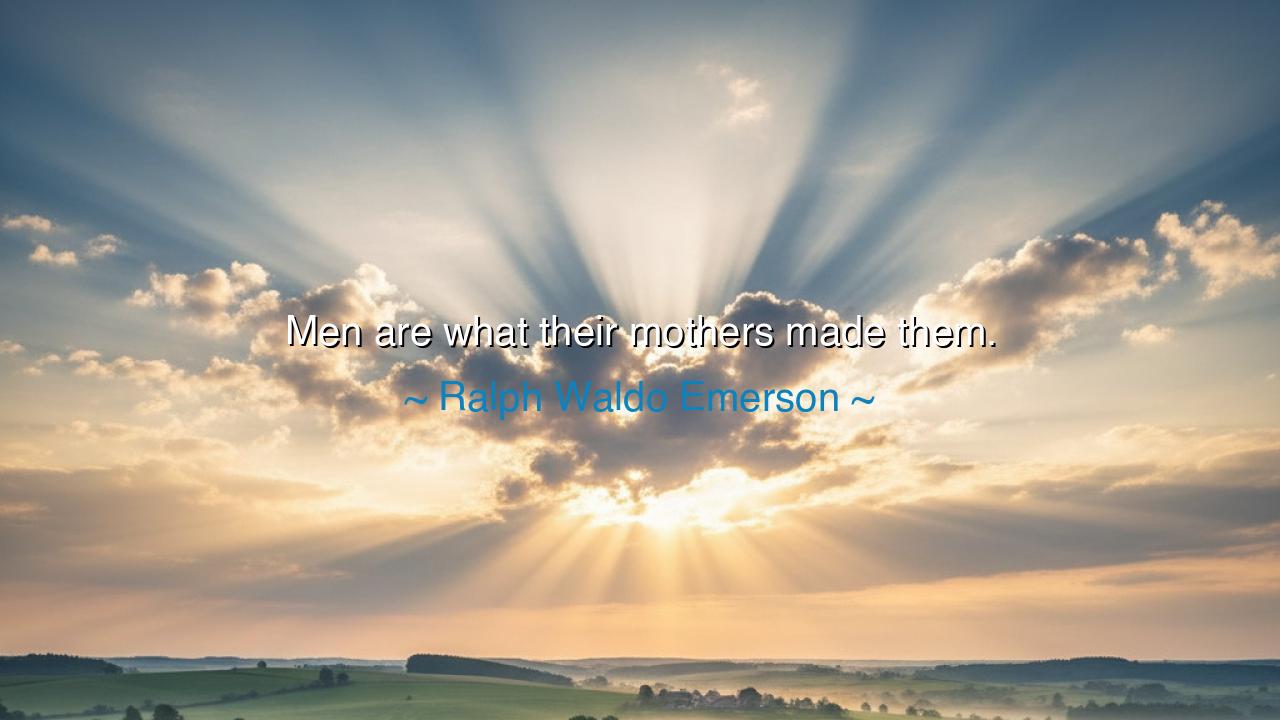
Men are what their mothers made them.






In the timeless and profound words of Ralph Waldo Emerson, “Men are what their mothers made them,” we hear a truth that stretches across the ages—a truth about the origins of character, the shaping of the soul, and the invisible hands that form the destiny of humankind. Emerson, the great sage of self-reliance and moral awakening, here speaks not of mere biology, but of influence, of the unseen power of motherhood that molds the foundations of every man’s nature. For though the world may teach ambition, and society may refine skill, it is the mother who first teaches conscience, tenderness, and the rhythm of the heart itself.
The origin of this quote lies in Emerson’s reflections on the nature of moral and spiritual inheritance. As one of the central figures of American transcendentalism, he believed that the spirit of a person was not created by chance, but shaped by the forces of love, wisdom, and nurture. He saw in the mother the first philosopher, the earliest poet, the quiet architect of virtue. For every great act of courage or compassion, Emerson knew, there was often a woman whose whispers, patience, and example had prepared the soul for greatness. When he said that “men are what their mothers made them,” he meant that the heart of civilization itself is born in the cradle, in the tenderness of a mother’s arms, and in the lessons she imparts before words are fully understood.
The ancients held this truth sacred. The Greeks honored Rhea, the mother of the gods, who gave birth to Zeus, Poseidon, and Hades—the very forces that ruled the world. The Egyptians revered Isis, mother of Horus, whose love restored her slain husband and gave birth to renewal. The Hindus still venerate Parvati, whose divine motherhood sustains both the gentle and the fierce aspects of creation. In every culture, the mother stands as the origin of life and virtue, the first teacher of balance between strength and mercy. Emerson’s words echo this ancient reverence, translated into the language of philosophy: that the world’s heroes, thinkers, and leaders are all, in truth, the works of a mother’s creation.
Consider the story of Abraham Lincoln, whose humility and compassion shaped a nation torn by division. When asked where his wisdom and moral strength came from, he answered simply, “All that I am, or hope to be, I owe to my angel mother.” Nancy Hanks Lincoln had no wealth or education, yet she gave her son something greater: faith, perseverance, and kindness. Her influence did not fade when she died; it lived within him, guiding every act of mercy, every word of justice. Emerson’s statement finds its perfect reflection here: Lincoln, like so many men of vision, was the mirror of his mother’s soul, her virtues transformed into deeds that changed the world.
This is the hidden power of mothers—to plant seeds in the unseen soil of the heart. A father may teach discipline and ambition, but the mother teaches empathy, morality, and the sacred value of life. Her lessons are not shouted from podiums, but whispered between the quiet moments of care: in the tending of wounds, the correction of faults, the forgiveness of mistakes. These small acts form the invisible foundation of the human spirit. A man’s conduct, his tenderness toward others, his courage to endure, his instinct for compassion—all these are echoes of his mother’s example. She is the living scripture written upon his soul.
Yet Emerson’s words carry another truth: that a mother’s influence is both blessing and burden. For just as virtue can be taught, so too can bitterness, pride, and fear. The hand that shapes also determines the direction of growth. Thus, his statement is not only praise but warning—reminding mothers that the weight of their love and example can shape the fate of nations through the lives of their sons. The mother who raises her child in anger may unknowingly sow the seeds of conflict; the mother who raises with compassion sows the roots of peace. The destiny of men—and through them, the destiny of civilization—rests first in the heart of the mother.
Let this wisdom, then, be carried as a sacred teaching: to shape a life is to shape eternity. Mothers, know your power and wield it with grace. Nurture not only the body but the soul; teach not only obedience, but virtue. And to sons and daughters, remember always the roots from which you came. Honor the love that formed you, for within it lies the foundation of your strength.
Thus, in the simple clarity of Ralph Waldo Emerson’s words, we find a truth that no age can outgrow: that every man carries within him the imprint of his mother’s heart. The kindness she showed, the lessons she taught, the forgiveness she offered—these form the pillars of his character. Empires rise and fall, philosophies shift and fade, but the mother’s influence endures beyond all time. For in every good man’s actions, in every noble thought, and in every compassionate deed, the quiet hand of his mother is still at work—guiding, blessing, and making the world anew.






AAdministratorAdministrator
Welcome, honored guests. Please leave a comment, we will respond soon